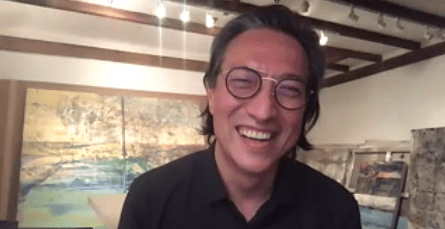Makoto Fujimura, former presidential appointee to the National Council of Arts and one of today’s premier living abstract painters, joined the Belmont community to share about his philosophy of “Culture Care,” an alternative to the “culture wars” that have characterized the political and cultural landscape for decades. In this event hosted by the Office of Spiritual Development as a part of the Debate 2020 Programming, Fujimura’s shared how Culture Care was born of his art and faith, how art can shape our culture and that beauty is vital to soul care.
Fujimura described how the tension of cultural and political brokenness has created a divide where people cannot talk to one another without being offended by what others consider to be sacred. He said that both sides are doing the same thing in a culture war. When we demonize the other side, we are only mirroring the hatred of the other side we are trying to fight against. No one wins in a culture war.
In response to this, Fujimura shared about Culture Care with the metaphor of kintsugi art. Kintsugi is a Japanese art form that takes broken pieces and puts them together to make something beautiful. Instead of fixing a broken bowl into it’s past perfect form, kintsugi masters make something beautiful out of the fractures, injecting a lacquer mixed with gold to mend areas of breakage. “This broken vessel can be mended to make new,” Fujimura said.
Fujimura uses this art form not just to mend broken bowls but also to think about our lives, to consider how the traumas and fractures of our own lives and culture can be mended. It is especially applicable to the political climate of our culture today.
“It’s not whether you vote for one candidate or the other. It’s not who wins and who loses. It’s how we talk about it that matters, that will create an enduring consequence to the next generation. If we keep fighting culture wars and keep fragmenting this nation, there are going to be consequences that, at some point, will be irreversible.” Fujimura said.
But he provided hope with the context of viewing culture wars as Christians with the gospel as the sacred truth. Jesus lived in conditions worse than our own, but told his followers not to be anxious or worry. Fujimura explained following Jesus requires sacrifice and love, and to live in Christ’s love means to face the scarcity of life injecting gold, love, into the fractures, just as Jesus did in his life.
Fujimura recognized that caring is costly and trauma cannot be fixed. Rather, the personal and cultural trauma has to be healed and mended and given a new design. We do not go back to the original, but have a new result that is more valuable. Political and racial divides are fractures that are widening in today’s world. Fujimura noted that we cannot try to fix these fractures, but we can honor the fractures, see the valid response of both sides and find beauty and joy instead of hatred and anxiety in the journey to mend them.



